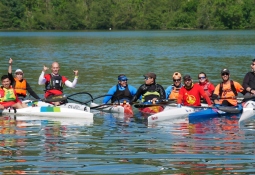Paarl – With the real prospect of another tough, low Berg River Canoe Marathon on the cards for the four day classic from Paarl to Velddrif from 13 to 16 July, race officials have tightened rules to safeguard the safety of every paddler in the field.
When the 2016 race rules were published on the race website, they included new rules requiring paddlers to attain specific proficiency levels at two pre-Berg races and introduced tougher cut-off times to ensure slower paddlers aren't left on the water trying to finish a stage after nightfall.
The rule changes have triggered rigorous debate in paddling circles, bringing into focus the legal requirements for the race organisers and the unusual river conditions expected as sub-Saharan Africa heads into the second year of the La Niña drought cycle.
Western Cape Canoe Union chair Eric Farringer has welcomed the debate and made it clear that the rule changes were made "by the paddlers, for the paddlers" and assured any potential Berg entrants that no paddler would be unduly prejudiced by these changes.
Farringer said that any paddler unable to secure two qualifying results within 160% of the race winner’s time was entitled to apply for an exemption up to a fortnight before the race. He also said that a new committee would be assembled to oversee the issue going forward.
"If you are an experienced Berg paddler, such exemptions will not be unreasonably withheld," said Farringer.
"For example, someone who has completed the surfski season and participates in regular paddling events but is unable for business reasons to attend the races in our relatively short paddling season, might be considered."
"The same applies to paddlers from other province who might not be able to race the qualifying races. A letter from their club safety officer and a breakdown of the paddling races they have taken part can accompany the request for exemption.
"If, however, that paddler is a novice, they will definitely need to complete two river races so the safety officer can judge their competence as well as their fitness," he added.
Farringer said that the qualifying criteria went hand in glove with the cut-off times on each stage and paddlers have to confirm that they will be happy to be asked to leave the race if they don't make any of the cut-off times.
"Several sections of the Berg will be difficult this year," he said, mentioning the low river expected and the rapid growth of water hyacinth in the upper reaches of the race course.
"To fall out, perhaps in part because you are tired, and be washed under such a block would be very dangerous," said Farringer. "Therefore cut off times will be strictly enforced for the safety of the paddlers as we cannot safely navigate these sections in the dark."
Farringer said that each stage's cut-off times would be reviewed daily, based on the prevailing weather and water conditions, and, if necessary, adjustments to the 15h20 cut-off time will be recommended by the Union Safety Officer, Ian Glass. He also confirmed that the first stage will start at 9am on Wednesday, 13 July to give paddlers plenty of daylight hours to complete the stage.
Organisers expect the planned first stage from Paarl to Hermon – a distance of 43km – to be easily paddleable, unlike last year when a water hyacinth infestation forced the race to start at Hermon.
"The river between Paarl and Hermon is quite open and easy this year so this should not be a big challenge," said Farringer.
While welcoming the debate, Farringer stressed that the rule changes were brought about by sub-committees comprised of experienced regular local paddlers who gave of their time to act in the best interests of the sport.
The Berg River Canoe marathon starts in Paarl on 13 July and ends at Velddrif on 16 July. More information can be found at www.berg.org.za
31 May 2016

